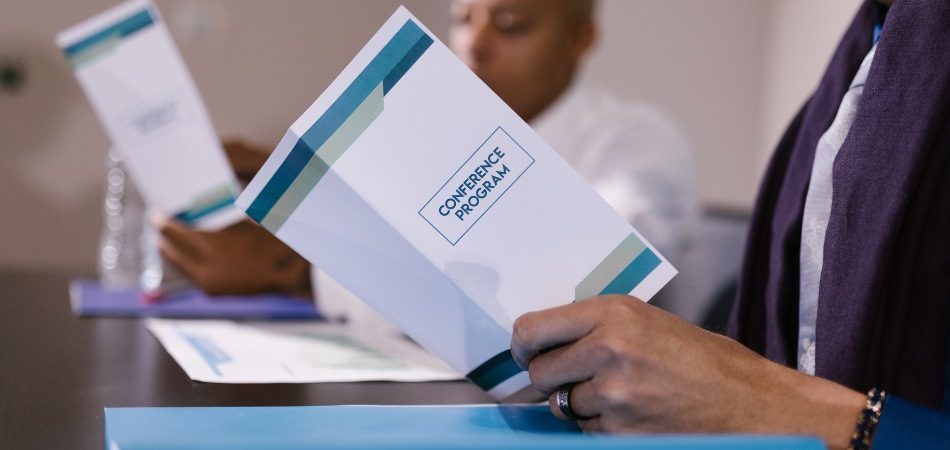Participating in an economics conference can be a transformative experience for aspiring scholars. These events offer a platform for individuals to showcase their research findings, paving the way for valuable exposure and constructive critiques. For many, the burning question is, can I present my research at an economics conference?
Yes, you can present your research at an economics conference if it aligns with the conference’s themes and submission guidelines. Most conferences welcome contributions from researchers, academics, and practitioners, and often have specific tracks or sessions for various subfields of economics.
In this article, we explore the difficulty of presenting research at economics conferences, outlining the steps and considerations to help budding economists seize this golden opportunity.
Concept of Economics Conference
Economics conferences serve as vital platforms for scholars, professionals, and students to converge and exchange ideas. These gatherings arrange intellectual dialogue on economic theories, policies, and real-world applications. Participants engage in comprehensive discussions, often leading to innovative solutions and advancements in the field.
These events feature a diverse array of topics, from macroeconomic trends to microeconomic case studies. Scholars present their research findings, shedding light on critical issues and sharing their insights with a receptive audience. Additionally, participating in Economics Conferences facilitates networking opportunities, enabling attendees to forge connections and collaborations that can influence the trajectory of their careers.
Economics conferences embody the dynamic nature of the discipline, encouraging a continual exploration of economic concepts and their impact on society. They play a pivotal role in knowledge dissemination, fostering a deeper understanding of economic phenomena while inspiring fresh perspectives and informed decision-making.
Can I Present My Research at An Economics Conference?
Navigating the world of academic conferences can be both exciting and daunting. Can I present my research at an economics conference? is a question often pondered by students and emerging economists. The answer, fortunately, is a resounding yes.
Economics conferences provide a significant avenue for scholars to showcase their work, regardless of their career stage. As an aspiring economist, you can indeed present your research at these conferences. These events offer a valuable platform for individuals to disseminate their findings, gain exposure, and receive constructive feedback from peers and experts.
The opportunity to present your research at an economics conference is a stepping stone to enhancing your academic profile and expanding your network within the field. It opens doors for collaboration, facilitates knowledge exchange, and may even lead to career-defining opportunities. Therefore, if you’ve ever questioned the possibility of showcasing your research at an economics conference, rest assured that the answer is a positive one. This opportunity welcomes your valuable contribution to the dynamic realm of economic discussions.
Benefits of Presenting Research at an Economics Conference
Presenting your research at an economics conference comes with many perks that can boost your career and knowledge in the field. International events like the Economics Conference in Canada 2024 can be a big stage to present research and get acknowledged by professionals. Let’s explore some of these advantages and how they can positively impact your academic and professional journey.
Exposure and Recognition
Presenting your research at an economics conference exposes your work to a wide and diverse audience, increasing its visibility within the academic and professional community. This recognition can lead to potential collaborations, invitations for guest lectures, and career-enhancing opportunities.
Feedback and Improvement
Conferences provide a platform to receive constructive feedback from peers and experts in your field. These insights not only help refine your research but also offer valuable perspectives on areas for improvement, ultimately enhancing the quality and impact of your work.
Networking Opportunities
Economics conferences facilitate interactions with fellow researchers, academics, and industry professionals. These connections can lead to valuable collaborations, research partnerships, access to resources, and even job offers or consultancy opportunities.
Staying Updated with Emerging Trends
Attending and presenting at conferences allows you to stay current with the latest trends, theories, and research developments in economics. This knowledge is not only essential for academic and professional growth but also ensures that your work remains relevant and impactful.
Publication Opportunities and Academic Credibility
Many conferences offer the chance to publish your research in conference proceedings or affiliated journals. These publications contribute to your academic credibility, expand your publication record, and provide a platform for your work to reach a wider audience.
Career Advancement and Recognition
Presenting at conferences enhances your academic and professional profile, which can have a significant impact on your career. It may lead to promotions, tenure considerations, recognition within your institution, and improved job prospects, both in academia and industry.
How to Present Research at an Economics Conference?
Presenting your research at an economics conference can be a pivotal moment in your academic or professional journey. To ensure success, it’s essential to follow a step-by-step process. Here’s an 8-step guide to help you present your research effectively at such conferences:
Step 1: Choose the Ideal Conference
Begin your journey by meticulously researching and selecting the most suitable economics conference for your research. Consider factors such as the conference’s theme, target audience, geographical location, and submission deadlines.
Step 2: Craft a Compelling Research Paper
Develop a well-structured research paper that effectively communicates your findings, methodology, and conclusions. Ensure that your paper adheres to the specific submission guidelines and word limits outlined by the conference organizers.
Step 3: Articulate an Engaging Abstract
Write a brief, interesting summary of your research. Make it clear, and mention what your study is about, how you conducted it, and what you expect to find. This summary should catch the attention of potential conference attendees and give them a quick idea of your work.
Step 4: Rehearse Your Presentation Act
Dedicate ample time to rehearse your presentation, focusing on clarity, organization, and time management. A well-rehearsed delivery will help you confidently present your research within the allotted time frame.
Step 5: Craft Visually Appealing Materials
When designing your presentation materials, use simple graphs, charts, and pictures that help explain your research. Keep them neat and easy to read. Well-made visuals make it easier for the audience to understand your findings.
Step 6: Actively Engage Your Audience
During your presentation, engage with your audience by maintaining eye contact, speaking clearly, and encouraging questions and discussions. Interacting with your audience can deepen their understanding and interest in your work.
Step 7: Prepare for Questions and Feedback
Anticipate potential questions and feedback by thoroughly understanding your research. Be ready to provide insightful responses and address constructive criticism with poise and confidence.
Step 8: Expand Your Network and Follow Up
Capitalize on networking opportunities at the conference to connect with fellow researchers and experts in your field. After your presentation, follow up with interested individuals to explore potential collaborations and stay connected within the academic community.
By following these comprehensive steps, you can confidently navigate the process of presenting your research at an economics conference, maximize its impact, and build valuable connections in your field.
Common Challenges While Presenting Research at an Economic Conference
Presenting research at an economic conference is a rewarding experience, but it also comes with its set of challenges. Here are some common hurdles that researchers often encounter when presenting at such conferences:
- Time Constraints: Economics conference presentations are typically time-limited. The typical duration of Economics Conferences ranges from 15 to 20 minutes. Condensing complex research into a concise presentation can be challenging.
- Engagement: Keeping the audience engaged throughout your presentation can be difficult. Economics topics can be dense, so maintaining interest is crucial.
- Q&A Handling: Fielding questions from the audience can be daunting, especially if the queries are unexpected or critical.
- Data Complexity: Presenting intricate data and statistical analysis clearly and understandably can be tricky.
- Conference Jitters: Nervousness and stage fright are common, particularly for first-time presenters.
- Competing with Other Presenters: Economics conferences often feature multiple presentations in parallel sessions. Ensuring your presentation stands out amidst competition is a challenge.
- Conference Logistics: Managing travel, accommodations, and conference logistics can be stressful, especially if the event is in an unfamiliar location.
- Feedback and Criticism: Receiving feedback, which can sometimes be critical, can be challenging for some presenters.
Addressing these challenges requires careful preparation, practice, and a proactive approach to ensure your research presentation at an economics conference is successful and impactful.
Frequently Asked Questions
Presenting your research at an economics conference can be a valuable opportunity to share your findings, gain feedback, and network with fellow economists. Below are some frequently asked questions regarding this topic.
Who can present at an economics conference?
Ans. Typically, anyone involved in economic research, including students, academics, and professionals, can present at an economics conference. Each conference may have its specific eligibility criteria, so it’s essential to review the guidelines provided by the conference organizers. Some conferences also welcome submissions from early-career researchers to encourage diverse perspectives.
How do I submit my research for consideration?
Ans. To submit your research, you usually need to prepare an abstract or full paper, depending on the conference’s submission requirements. This document should outline your research question, methodology, and key findings. After preparing your submission, follow the conference’s submission guidelines, which often include deadlines and formats for submission.
What should I expect during the presentation?
Ans. During the presentation, you can expect to summarize your research findings, typically within a specified time frame, followed by a question-and-answer session. It’s important to prepare a clear and engaging presentation that highlights your main points and invites discussion. Be ready to engage with feedback and questions from both the audience and other presenters.
Are there any costs associated with presenting at a conference?
Ans. Yes, presenting at an economics conference often involves registration fees, which can vary widely depending on the conference’s prestige and location. Additionally, you may incur travel and accommodation expenses if the conference is not held locally. It’s advisable to check for any available funding or grants that might assist with these costs.
Can I publish my research after presenting at a conference?
Ans. Yes, many conferences offer the opportunity to publish presented research in their proceedings or associated journals. However, you should always check the specific publication policies of the conference. Additionally, presenting at a conference can enhance the visibility of your research, potentially leading to further publication opportunities in academic journals.
Conclusion
The journey of presenting research at an economics conference is indeed an exciting and rewarding one. It begins with the burning question: can I present my research at an economics conference? The answer, as we’ve discovered, is a clear yes. Economics conferences offer aspiring scholars a transformative platform to share their findings, gain exposure, and receive valuable feedback.
However, it’s essential to recognize that this journey is not without its challenges. From time constraints to data complexity, each hurdle presents an opportunity for growth. With thorough preparation and adherence to the steps outlined, you can confidently navigate these challenges and make a lasting impact at economics conferences.
In summary, if you’ve ever questioned the possibility of presenting your research at an economics conference, the path is open for you to embrace. Seize the opportunity to be part of the dynamic realm of economic discussions and make your valuable contribution to this vibrant field








